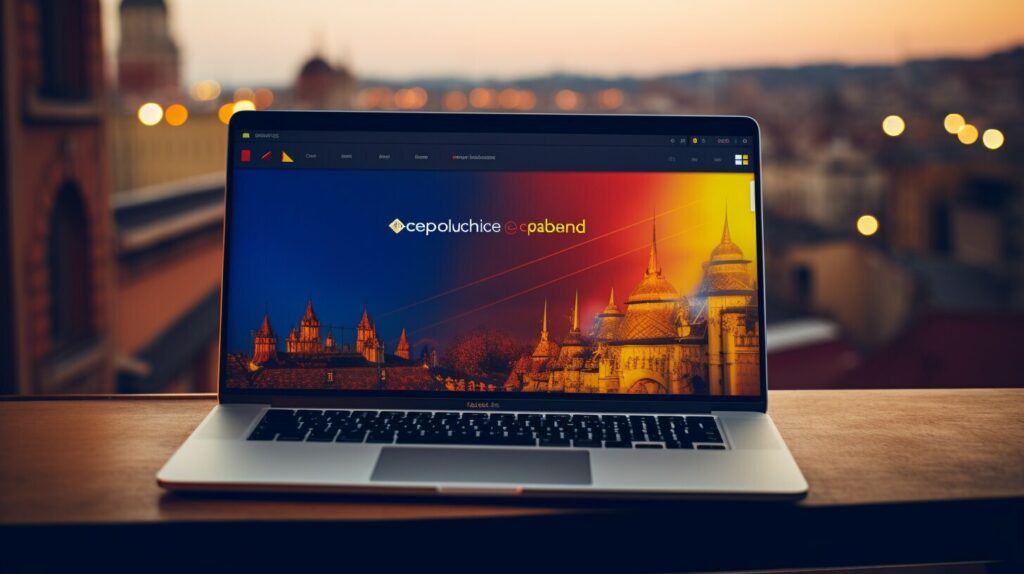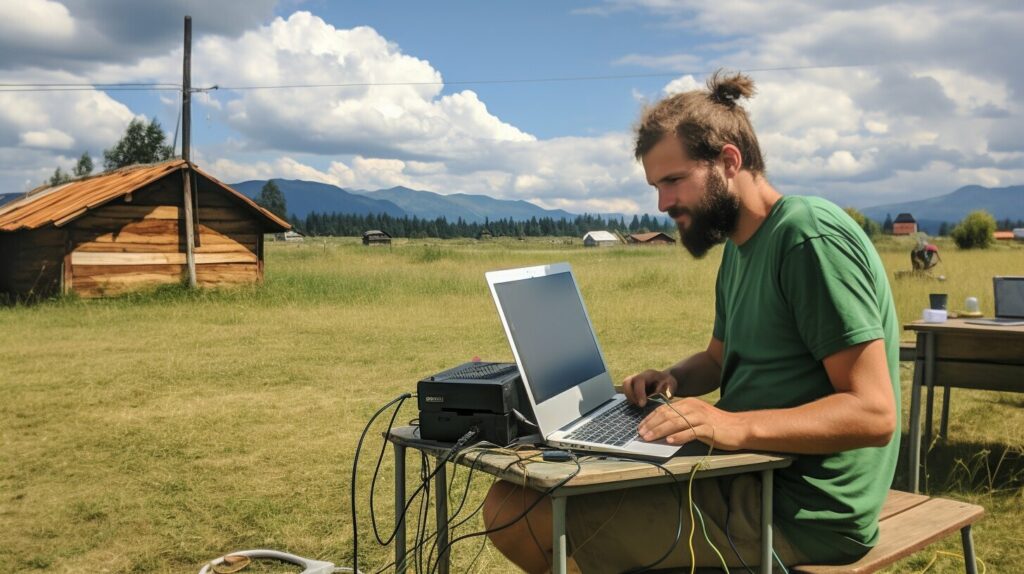Digital Nomad Visa Romania: Your Guide to Remote Work Exploration
Are you considering living the life of a digital nomad in Romania? Discover the freedom of remote work with the digital nomad visa Romania.
The Romanian government introduced the Romania digital nomad visa in December 2021, allowing remote workers to live and work in Romania for up to 12 months. To be eligible for the visa, applicants must work for a company registered outside Romania, have average earnings three times the gross monthly average salary in Romania (about €3,700 per month), and gather various documents such as proof of employment, information about the company, a letter of intent, proof of paid taxes, a valid ticket, proof of sufficient financial means, proof of health insurance, a clean criminal record, and proof of accommodation.
To apply for the visa, applicants must create an online account, prepare the required documents, and apply online on the Romanian eVisa Platform. The processing time for the visa is about two weeks. After entering Romania, applicants must apply for a residence permit at the local office of the General Inspectorate for Immigration. The residence permit application is processed within a month. The Romania digital nomad visa is valid for one year and can be renewed as long as the initial requirements are met.
Romania is known for its fast internet connection and offers a cheap cost of living, making it an attractive destination for digital nomads. The country has many beautiful cities to explore, like Bucharest, Brasov, Timisoara, Cluj Napoca, and Constanta. There are also coworking spaces available for remote work.
Overall, Romania provides a favorable environment for digital nomads with its fast internet, affordable prices, and beautiful attractions. It offers a digital nomad visa that allows for long-term stays, making it an appealing choice for remote workers.
The Romanian Digital Nomad Visa: Requirements and Application Process
To obtain the Romanian digital nomad visa, there are certain requirements and a specific application process that you need to follow.
The Romanian government introduced this visa in December 2021, allowing remote workers to live and work in Romania for up to 12 months. It offers an excellent opportunity to explore the country while continuing your job remotely.
In order to be eligible for the Romanian digital nomad visa, you must meet several requirements.
First, you need to work for a company that is registered outside of Romania.
Additionally, your average earnings should be three times the gross monthly average salary in Romania, which is approximately €3,700 per month.
This ensures that you have sufficient financial means to support yourself during your stay.
Once you meet these requirements, the next step is to gather the necessary documents for your application.
These include proof of employment, information about your company, a letter of intent, proof of paid taxes, a valid ticket, proof of sufficient financial means, proof of health insurance, a clean criminal record, and proof of accommodation.
It’s important to have all these documents ready before starting the application process.
When you are ready to apply, you must create an online account and submit your application on the Romanian eVisa Platform.
The processing time for the visa is approximately two weeks. Once your visa is approved, you can enter Romania and begin your digital nomad journey. After arrival, you will also need to apply for a residence permit at the local office of the General Inspectorate for Immigration, which usually takes around a month to process.
The residence permit allows you to stay in Romania for the duration of your visa, which is one year and can be renewed if you continue to meet the initial requirements.

Romania offers digital nomads a favorable environment to live and work. With its fast internet connection and affordable cost of living, it is an attractive destination for remote workers. There are many beautiful cities to explore, such as Bucharest, Cluj-Napoca, Timisoara, and Constanta.
Additionally, there are coworking spaces available that provide a productive work environment for digital nomads.
Required Documents for the Digital Nomad Visa in Romania
To successfully apply for the digital nomad visa in Romania, you will need to prepare various documents to demonstrate your eligibility. These documents include:
- Proof of employment: You will need to provide evidence of your current employment, such as an employment contract or letter from your employer.
- Information about the company: This includes details about the company you work for, including its name, address, and contact information.
- Letter of intent: A letter stating your intention to live and work in Romania as a digital nomad.
- Proof of paid taxes: This can be in the form of tax returns or a certificate from the tax authorities in your home country.
- Valid ticket: A return or onward ticket to Romania.
- Proof of sufficient financial means: You must provide evidence that you have enough funds to support yourself during your stay in Romania.
- Proof of health insurance: A document showing that you have valid health insurance coverage.
- Clean criminal record: You will need to provide a criminal record certificate from your home country.
- Proof of accommodation: This can be in the form of a rental agreement or hotel reservation.
It is important to gather all the required documents and ensure they are up to date and valid before starting the application process. Missing or incomplete documents may result in delays or denial of your visa application.
Note: Required documents may vary slightly depending on your country of residence, so it is advisable to check with the Romanian embassy or consulate in your home country for specific requirements.
Once you have gathered all the necessary documents, you can proceed with the application process for the digital nomad visa in Romania.

| Document | Details |
|---|---|
| Proof of employment | Employment contract or letter from employer |
| Information about the company | Name, address, and contact information |
| Letter of intent | Stating intention to live and work in Romania as a digital nomad |
| Proof of paid taxes | Tax returns or certificate from tax authorities |
| Valid ticket | Return or onward ticket to Romania |
| Proof of sufficient financial means | Evidence of funds to support yourself |
| Proof of health insurance | Valid health insurance coverage |
| Clean criminal record | Criminal record certificate from home country |
| Proof of accommodation | Rental agreement or hotel reservation |
Applying for the Digital Nomad Visa in Romania
Applying for the digital nomad visa in Romania involves creating an online account and submitting your application through the Romanian eVisa Platform.
This streamlined online process makes it convenient for remote workers to apply for and obtain their visa without the need for in-person appointments or visits to the embassy.
To begin your application, you will need to provide personal information, including your name, passport details, and contact information. It is important to ensure that all the information you provide is accurate and up-to-date.

Once you have created your online account, you will be guided through the application process step by step. You will be required to upload the necessary documents, such as proof of employment, information about your company, a letter of intent, proof of paid taxes, a valid ticket, proof of sufficient financial means, proof of health insurance, a clean criminal record, and proof of accommodation. It is essential to gather and prepare these documents beforehand to ensure a smooth and efficient application process.
After submitting your application, the processing time for the digital nomad visa in Romania is approximately two weeks. During this time, your application will be reviewed by the relevant authorities, and you will be notified of the outcome via email. Once your visa is approved, you can proceed with your travel arrangements and prepare for your digital nomad journey in Romania.
Living and Working in Romania as a Digital Nomad
One of the advantages of living and working in Romania as a digital nomad is the affordable cost of living.
You can enjoy a high quality of life without breaking the bank.
Accommodation, transportation, and dining out are all reasonably priced, allowing you to make the most of your time in the country. Plus, with the Romanian digital nomad visa, you can stay for up to 12 months, giving you ample time to explore all that Romania has to offer.
As a digital nomad in Romania, you’ll also have access to fast and reliable internet connection.
This is crucial for remote workers who rely on internet connectivity to stay productive and connected with their clients or colleagues. Whether you’re working from a cozy coffee shop or a dedicated coworking space, you can be confident that you’ll have the bandwidth you need to get the job done.
When it comes to coworking spaces, Romania has plenty to choose from.
These shared workspaces provide a professional environment where you can work alongside like-minded individuals and network with other entrepreneurs and remote workers.
Some popular coworking spaces in Romania include Impact Hub, The Office, and Tech Hub, just to name a few.
These spaces often offer amenities such as high-speed internet, comfortable workstations, meeting rooms, and even social events.
Overall, Romania provides an attractive setting for digital nomads looking to live and work in a new and exciting country.
With its affordable cost of living, fast internet connection, and abundant coworking spaces, Romania is a destination worth considering for remote workers.
So, if you’re ready to embark on a new adventure and explore the beauty of Romania while working remotely, the Romanian digital nomad visa might just be your ticket to a fulfilling and enriching experience.

Conclusion
In conclusion, the digital nomad visa in Romania opens up exciting opportunities for remote work exploration, making it an attractive choice for digital nomads looking for a vibrant and affordable destination.
FAQ
Q: What is the Romanian digital nomad visa?
A: The Romanian digital nomad visa is a visa introduced by the Romanian government that allows remote workers to live and work in Romania for up to 12 months.
Q: What are the requirements to obtain the digital nomad visa in Romania?
A: To be eligible for the digital nomad visa in Romania, applicants must work for a company registered outside Romania, have average earnings three times the gross monthly average salary in Romania (about €3,700 per month), and gather various documents such as proof of employment, information about the company, a letter of intent, proof of paid taxes, a valid ticket, proof of sufficient financial means, proof of health insurance, a clean criminal record, and proof of accommodation.
Q: How do I apply for the digital nomad visa in Romania?
A: To apply for the digital nomad visa in Romania, applicants must create an online account, prepare the required documents, and apply online on the Romanian eVisa Platform.
The processing time for the visa is about two weeks.
After entering Romania, applicants must apply for a residence permit at the local office of the General Inspectorate for Immigration. The residence permit application is processed within a month.
Q: How long is the digital nomad visa in Romania valid for?
A: The digital nomad visa in Romania is valid for one year and can be renewed as long as the initial requirements are met.
Q: What are the benefits of living and working in Romania as a digital nomad?
A: Romania offers a fast internet connection, affordable cost of living, and beautiful cities to explore like Bucharest, Brasov, Timisoara, Cluj Napoca, and Constanta.
There are also coworking spaces available for remote work.
Q: Why should I consider the digital nomad visa in Romania?
A: The digital nomad visa in Romania provides a favorable environment for remote workers with its fast internet, affordable prices, and attractive attractions.
It allows for long-term stays, making it an appealing choice for digital nomads.
For more informations, please do not hesitate to contact us at e-mail office@theromanianlawyers.com

